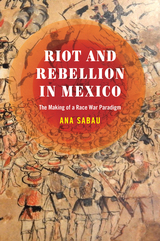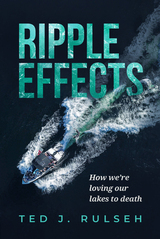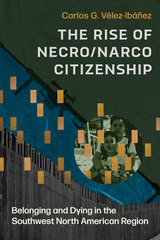

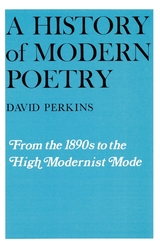
The first comprehensive history of modern poetry in English from the 1890s to the 1920s, this book embraces an era of enormous creative variety—the formative period during which the Romantic traditions of the past were abandoned or transformed and a major new literature created. By the end of the period covered, Eliot’s The Waste Land, Lawrence’s Birds, Beasts and Flowers, Stevens’s Harmonium, and Pound’s Draft of XVI Cantos had been published, and the first post-Eliot generation of poets was beginning to emerge.
More than a hundred poets are treated in this volume, and many more are noticed in passing. David Perkins discusses each poet and type of poetry with keen critical appreciation. He traces opposed and evolving assumptions about poetry, and considers the effects on poetry of its changing audiences, of premises and procedures in literary criticism, of the publishing outlets poets could hope to use, and the interrelations of poetry with developments in the other arts—the novel, painting, film, music—as well as in social, political, and intellectual life. The poetry of the United States and that of the British Isles are seen in interplay rather than separately.
This book is an important contribution to the understanding of modern literature. At the same time, it throws new light on the cultural history of both America and Britain in the twentieth century.

There have been many books on early modernist poetry, not so many on its various sequels, and still fewer on the currents and cross-currents of poetry since World War II. Until now there has been no single comprehensive history of British and American poetry throughout the half century from the mid-1920s to the recent past. This David Perkins is uniquely equipped to provide; only a critic as well informed as he in the whole range of twentieth-century poetry could offer a lucid, coherent, and structured account of so diverse a body of work.
Perkins devotes major discussions to the later careers of the first Modernist poets, such as Eliot, Pound, Stevens, and Williams, and to their immediate followers in the United States, E. E. Cummings, Archibald MacLeish, and Hart Crane; to W. H. Auden, Dylan Thomas, and the period style of the 1930s; to the emergence of the New Criticism and of a poetry reflecting its tenets in William Empson, John Crowe Ransom, Allen Tate, John Berryman, and Robert Lowell, and to the reaction against this style; to postwar Great Britain from Philip Larkin and the “Movement” in the 1950s to Ted Hughes, Charles Tomlinson, and Geoffrey Hill; to the theory and style of “open form” in Charles Olson and Robert Duncan; to Allen Ginsberg and the Beat poetry of the 1960s; to the poetry of women’s experience in Sylvia Plath and Adrienne Rich; to the work of Black poets from Robert Hayden and Gwendolyn Brooks to Amiri Baraka; and to Elizabeth Bishop, W. S. Merwin, A. R. Ammons, John Ashbery, and James Merrill.
Perkins discusses some 160 poets, mentioning many others more briefly, and does not hesitate to explain, to criticize, to admire, to render judgments. He clarifies the complex interrelations of individuals, groups, and movements and the contexts in which the poets worked: not only the predecessors and contemporaries they responded to but the journals that published them, the expectations of the audience, changing premises about poetry, the writings of critics, developments in other arts, and the momentous events of political and social history. Readers seeking guidance through the maze of postwar poetry will find the second half of the book especially illuminating.
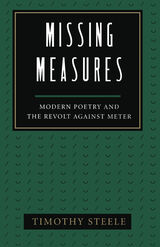
By the close of the nineteenth century, many poets had abandoned rhyme and meter in favor of “free verse.” Nearly one hundred years later, a growing number of younger poets are reclaiming traditional conventions of prosody by composing rhymed and measured poetry.
Missing Measures is the first full articulation of the aesthetics of this new movement. Timothy Steele, one of the best of those poets who are sometimes called the “New Formalists,” treats his subject against a backdrop of the long history of ideas about poetry, formulated first by the ancients and re-examined and re-interpreted by subsequent writers.
Steele offers a new perspective on the wholesale departure from tradition proclaimed in modernist critical justifications. A rare marriage of clear writing, careful scholarship, and bold thinking, Missing Measures provides a vital new movement with a critical manifesto.
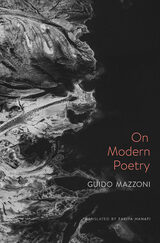
An incisive, unified account of modern poetry in the Western tradition, arguing that the emergence of the lyric as a dominant verse style is emblematic of the age of the individual.
Between the end of the eighteenth century and the beginning of the twentieth, poetry in the West was transformed. The now-common idea that poetry mostly corresponds with the lyric in the modern sense—a genre in which a first-person speaker talks self-referentially—was foreign to ancient, medieval, and Renaissance poetics. Yet in a relatively short time, age-old habits gave way. Poets acquired unprecedented freedom to write obscurely about private experiences, break rules of meter and syntax, use new vocabulary, and entangle first-person speakers with their own real-life identities. Poetry thus became the most subjective genre of modern literature.
On Modern Poetry reconstructs this metamorphosis, combining theoretical reflections with literary history and close readings of poets from Giacomo Leopardi to Louise Glück. Guido Mazzoni shows that the evolution of modern poetry involved significant changes in the way poetry was perceived, encouraged the construction of first-person poetic personas, and dramatically altered verse style. He interprets these developments as symptoms of profound historical and cultural shifts in the modern period: the crisis of tradition, the rise of individualism, the privileging of self-expression and its paradoxes. Mazzoni also reflects on the place of poetry in mass culture today, when its role has been largely assumed by popular music.
The result is a rich history of literary modernity and a bold new account of poetry’s transformations across centuries and national traditions.
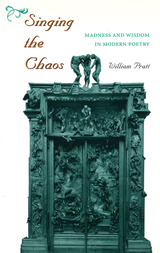
Singing the Chaos: Madness and Wisdom in Modern Poetry combines both a historical and a critical approach toward the works of major British, American, French, German, and Russian poets. Comprehensive in scope and arranged chronologically to survey a century of high poetic achievement, the study is unified by Pratt's overriding argument that "modern poets have endowed a disintegrating civilization with humane wisdom by 'singing the chaos' that surrounds them, making ours a great age in spite of itself."
In developing this central theme, Pratt brings alive the energy, the freshness, and the originality of technique that made Baudelaire, Pound, Yeats, Rilke, Eliot, and others the initiators of the revolution in poetry. He brings a more complete, clearer perspective to other major themes: modernism as an age of irony; poets as both madmen and geniuses; the modern poet as tragic hero; the dominance of religious or visionary truths over social or political issues; and the combination of radical experiments in poetic form with an apocalyptic view of Western civilization. His detailed treatment of the Fugitive poets and his recognition of their prominent role in twentieth-century literature constitute an important historical revision.
Brilliantly informed, insightful, and, above all, accurately sympathetic to the points of view of the poets Pratt presents, Singing the Chaos is that rare book that belongs on all shelves devoted to modernist poetry.
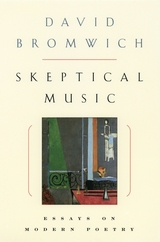
The two general essays that frame Skeptical Music make Bromwich's aesthetic commitments clear. In "An Art without Importance," published here for the first time, Bromwich underscores the trust between author and reader that gives language its subtlety and depth, and makes the written word adequate to the reality that poetry captures. For Bromwich, understanding the work of a poet is like getting to know a person; it is a kind of reading that involves a mutual attraction of temperaments. The controversial final essay, "How Moral Is Taste?," explores the points at which aesthetic and moral considerations uneasily converge. In this timely essay, Bromwich argues that the wish for excitement that poetry draws upon is at once primitive and irreducible.
Skeptical Music most notably offers incomparable readings of individual poets. An essay on the complex relationship between Hart Crane and T. S. Eliot shows how the delicate shifts of tone and shading in their work register both affinity and resistance. A revealing look at W. H. Auden traces the process by which the voice of a generation changed from prophet to domestic ironist. Whether discussing heroism in the poetry of Wallace Stevens, considering self-reflection in the poems of Elizabeth Bishop, or exploring the battle between the self and its images in the work of John Ashbery, Skeptical Music will make readers think again about what poetry is, and even more important, why it still matters.
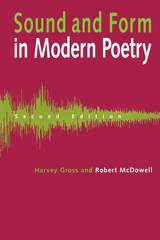
Poet, critic, and editor Robert McDowell has updated this classic text in the light of the poetic and critical developments of the last three decades. Segments on Dickinson, Robinson, Frost, Jeffers, and Lowell, among other poets, have been greatly expanded, and Ashbery, Creeley, Ginsberg, Hall, Kees, Kumin, Levertov, Levine, O'Hara, Plath, Rich, Simpson, and Wilbur added, among others. The epilogue discusses a new generation of poets whose works will likely be read well into the next century-- among others, Thomas M. Disch, Rita Dove, Dana Gioia, Emily Grosholz, Mark Jarman, Molly Peacock, Gjertrud Schnackenberg, Timothy Steele, Mary Swander, and Marilyn Nelson Waniek.
Over the last ten years, the most inspiring topic of conversation and argument among poets and their readers has been the resurgence of narrative and traditional forms. The new Sound and Form in Modern Poetry is a seminal text in this discussion, examining not only this movement but all of the important developments (Dadaism, Surrealism, Imagism, Language Poetry, and the Confessional School) that have defined our poetry in the twentieth century and have set the stage for poetry's continued life in the twenty-first. The original Sound and Form in Modern Poetry enjoyed extensive classroom use as a text; the revised version promises to be even more accessible, and more essential, for years to come.
The late Harvey Gross was Professor of Comparative Literature, State University of New York at Stony Brook.
Robert McDowell is publisher and editor of Story Line Press, and is also poet, critic, translator, fiction writer, and essayist.
READERS
Browse our collection.
PUBLISHERS
See BiblioVault's publisher services.
STUDENT SERVICES
Files for college accessibility offices.
UChicago Accessibility Resources
home | accessibility | search | about | contact us
BiblioVault ® 2001 - 2025
The University of Chicago Press




